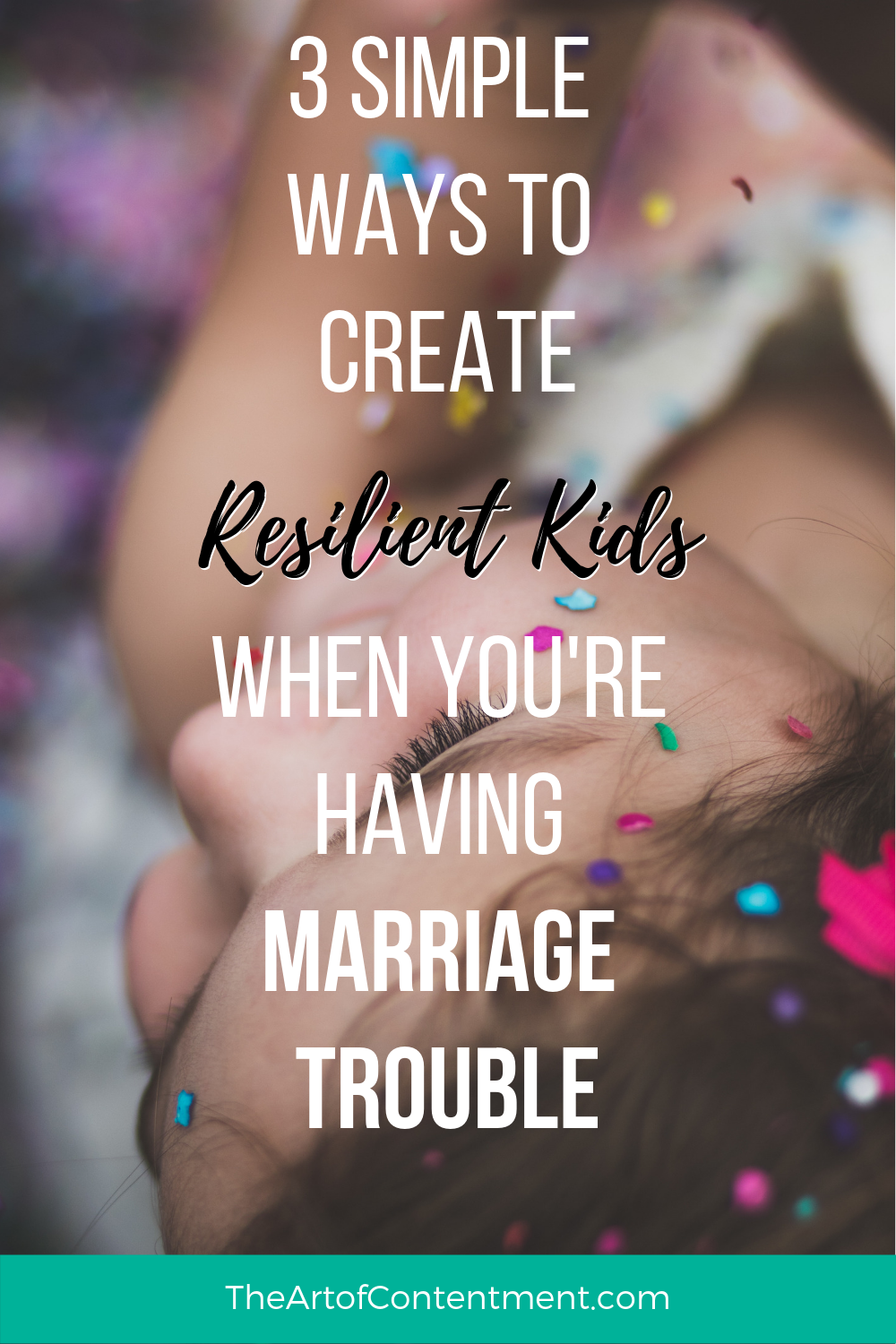 “Daddy’s going to live by himself for a while. But we love you, and that’s never going to change.”
“Daddy’s going to live by himself for a while. But we love you, and that’s never going to change.”
No one gets married expecting to say these words to their precious children. Once, we sat together rubbing a hand over a large belly and imagining the happy future of the child within. But this wasn’t the future we expected.
Maybe you and your husband are considering a separation. Maybe you’re already separated and the marriage is close to being a thing of the past. Or perhaps you’re committed to staying together, but you’re arguing a lot. Now your children are becoming moody, clingy, and self-blaming as they try to understand marital issues that are too big for their tender hearts.
Our priority is to protect our children while we wrangle with the adult issues. When the peace of our home is rocked by instability between husbands and wives, our jobs as parents doesn’t change: Protecting our kids and training them to be resilient.
So how do we instill the bounce-back in hearts that are breaking?
I sat down with professional counselor and wise woman Mary Belote M.S., NCC, LCPC to talk about challenging relationships in the home. Her advice on protecting our kids by building resiliency was one of the most helpful parts of the interview.
It was too good not to share. These three guiding principles will help you shield your children and promote resiliency even when relationships at home go awry.
1.Don’t protect kids from every bad thing – instead, balance them.
Our first job as parents is to protect our children, and it’s tempting to shield them from the marital trouble at home. We shouldn’t be sharing the specifics of our marital problems with our kids, but we do need to be open and honest about the hurts in the home. Pretending everything is copacetic when the kids can hear your hushed but harsh words through the bedroom door just puts a wall between you and your little ones.
Instead, leave the door open to discussion. Talk about problems and let them ask questions. If major changes are headed your way – daddy is moving out or the kids will be going to a babysitter while mommy and daddy go to counseling – then prepare the kids for it.
Once we’ve opened honest communication with our kids, we need to offer balance. While there’s tension in our marriage, increase the kids’ interaction with healthy, positive people. Extra weekends with grandma and grandpa, dinners with aunts and uncles, or play dates with friends from church all count toward balancing the relationship scales.
These vibrant and stable relationships will pour positivity back into your children’s hearts and provide a life raft of normalcy during turbulent times. Don’t be afraid to ask people for help. People who love and care about you and your kids will probably be honored to pitch in.
Even when we bring in affirmative relationships to disarm the discouraging atmosphere at home, it’s not going to fix everything. Next, we’ll peek into our kids’ hearts with a nightly debrief.
2. Interview your kids with a nightly debrief.
A nightly debrief works well for verbal kids. It goes like this:
Cuddle up with your child at the end of the day and ask:
Did anything make you sad today?
Did someone say she would do something but then didn’t keep her word?
How do you feel?
The purpose of the debrief is to discover what sense the child is making about what they see.
You’re looking for “What in the home is about me?” Kids may not verbalize it clearly, but they’re likely taking on at least partial blame for what’s going on between mom and dad. We need to tease out those clues so we can redirect self-blaming thoughts with our third key to resilience: Redirecting and retraining.
3.Redirect and retrain: Planting seeds.
No mom among us will be surprised to learn that kids are egocentric. Really. Yeah. The work of childhood is to learn the world and their place in it. But this “me, me, me” thinking has a dark side because children are apt to blame themselves for problems between the parents. We combat this destructive mindset by planting seeds.
For example:
You: “Do you think daddy yelled because you got a D on your test?”
Child nods.
You: “What if daddy yelled because he had a bad day at work?”
By asking thoughtful questions, we can begin to break our kids’ incorrect cause-effect thinking. Then we can replace faulty self-blame ideas with truth.
Notice that the exchange between mom and child isn’t a declaratory statement: “Daddy yelled because he had a bad day at work, not because of your test grade.” You’re asking your child to accept on faith that the marital tension isn’t about her, when her immature child’s brain makes her feel the opposite. She might take that seed and drop it by the wayside. But asking your child a question goes deeper. It gives her a seed to plant and mull over and helps her come to a conclusion herself rather than being given one by you.
A question also invites a response. With a declaratory statement, no answer is required. But the seed planted with a question offers an opportunity for conversation. It may be just the nudge your little one needs to open up and talk about her feelings. Remember, seeds are powerful things. They grow into towering trees. They grow, like faith, from a small thing cradled in the heart to strong roots curled deep into the earth. Roots that help her withstand storms.
I know how it feels to watch love fall apart. My husband and I were separated for a year and my heart hurt for my kids’ future. They were too young to understand much, but one day they would. One day they would ask questions and need answers. If you’re in a season of heartache in your home, may God bless you. My sincere prayer for you is that your home and hope is restored. In the meantime, protect your children’s hearts by balancing, debriefing, and planting seeds. Your little ones need you and you’re strong enough. Stronger than you know because you’re not alone. King David wrote: “I will both lie down in peace, and sleep; for You alone, O Lord, make me dwell in safety.” Psalm 4:8
Mary Belote M.S., NCC, LCPC is a professional counselor with Life Christian Counseling practicing in White Plains, Maryland. She brings a pastoral approach as she guides clients toward fully participating in their own lives, just as Jesus intended. Mrs. Belote is married to Tom, and they have three adult children. You can catch up with Mary Belote at http://www.lifechristiancounseling.com/mary-belote.htm
